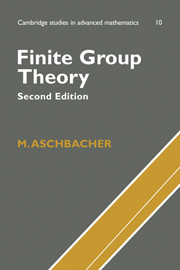Book contents
- Frontmatter
- Contents
- Preface
- 1 Preliminary results
- 2 Permutation representations
- 3 Representations of groups on groups
- 4 Linear representations
- 5 Permutation groups
- 6 Extensions of groups and modules
- 7 Spaces with forms
- 8 p-groups
- 9 Change of field of a linear representation
- 10 Presentations of groups
- 11 The generalized Fitting subgroup
- 12 Linear representations of finite groups
- 13 Transfer and fusion
- 14 The geometry of groups of Lie type
- 15 Signalizer functors
- 16 Finite simple groups
- Appendix
- References
- List of Symbols
- Index
10 - Presentations of groups
Published online by Cambridge University Press: 05 June 2012
- Frontmatter
- Contents
- Preface
- 1 Preliminary results
- 2 Permutation representations
- 3 Representations of groups on groups
- 4 Linear representations
- 5 Permutation groups
- 6 Extensions of groups and modules
- 7 Spaces with forms
- 8 p-groups
- 9 Change of field of a linear representation
- 10 Presentations of groups
- 11 The generalized Fitting subgroup
- 12 Linear representations of finite groups
- 13 Transfer and fusion
- 14 The geometry of groups of Lie type
- 15 Signalizer functors
- 16 Finite simple groups
- Appendix
- References
- List of Symbols
- Index
Summary
A group F is free with free generating set X if it possesses the following universal property: each function α: X → H of X into a group H extends uniquely to a homomorphism of F into H. We find in section 28 that for each cardinal C there exists (up to isomorphism) a unique free group F with free generating set of cardinality C. Less precisely: F is the largest group generated by X.
If W is a set of words in the alphabet X ∪ X-1, it develops that there is also a largest group G generated by X with w = 1 in G for each w ∈ W. This is the group Grp(X : W) generated by X subject to the relations w = 1 for w ∈ W.
In section 29 we investigate Grp(X: W) when X = {x1,…, xn] is finite and W consists of the words (xjxj)mij, for suitable integral matrices (mij). Such a group is called a Coxeter group. For example finite symmetric groups are Coxeter groups. We find that Coxeter groups admit a representation π: G → O(V, Q) where (V, Q) is an orthogonal space over the reals and Xπ consists of reflections. If G is finite (V, Q) turns out to be Euclidean space. Finite Coxeter groups are investigated via this representation in section 30, which develops the elementary theory of root systems.
The theory of Coxeter groups will be used extensively in chapter 14 to study the classical groups from a geometric point of view.
- Type
- Chapter
- Information
- Finite Group Theory , pp. 138 - 155Publisher: Cambridge University PressPrint publication year: 2000



